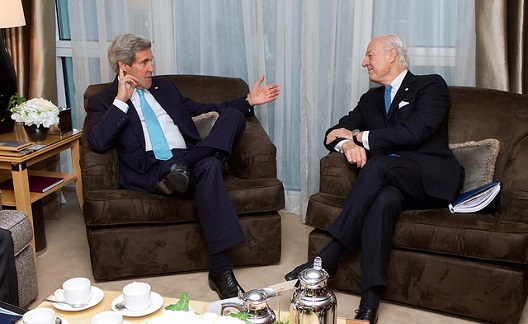 Foreign Policy published an intriguing article by Aaron David Miller, arguing that the current US Syria policy is the inevitable outcome of President Barack Obama’s foreign policy worldview. Among these beliefs, Miller cited the president’s determination to extricate the United States from and keep it out of wars; his skepticism of the ability of the United States to shape complex political outcomes abroad; and his refusal to take action that would jeopardize nuclear negotiations with Iran. The article highlights the oft-limited utility of calling for policies that violate the administration’s most deeply held beliefs, which arguments for bold, decisive US action tend to neglect. There is always a place and need for strong voices calling for major policy shifts, of course. But if few analysts present options for more limited policies that can gain traction with policymakers, modest but important opportunities to strengthen US policy in Syria will be missed.
Foreign Policy published an intriguing article by Aaron David Miller, arguing that the current US Syria policy is the inevitable outcome of President Barack Obama’s foreign policy worldview. Among these beliefs, Miller cited the president’s determination to extricate the United States from and keep it out of wars; his skepticism of the ability of the United States to shape complex political outcomes abroad; and his refusal to take action that would jeopardize nuclear negotiations with Iran. The article highlights the oft-limited utility of calling for policies that violate the administration’s most deeply held beliefs, which arguments for bold, decisive US action tend to neglect. There is always a place and need for strong voices calling for major policy shifts, of course. But if few analysts present options for more limited policies that can gain traction with policymakers, modest but important opportunities to strengthen US policy in Syria will be missed.
Strong arguments abound for robust US action in Syria: For example, an early US military intervention against the regime would have ended the war swiftly and empowered insurgent groups more palatable than most of the current players. Large-scale material support for non-jihadist groups—whatever their serious flaws—would lead to a healthier Syria than the one we see today, where the most capable militias include the Islamic State (ISIS or ISIL), the al-Qaeda-linked Jabhat al Nusra, Hezbollah, and the Assad regime. A no-fly zone over all Syria, which many interventionists continue to demand, could lead to an early regime defeat by less radical insurgent groups. At the least, it would save thousands of civilian lives and curb the wholesale destruction of Syrian villages, towns, and cities, while freeing insurgents to focus on fighting ISIS and other extremists.
Obviously, President Obama disagrees. Advocates of greater US action in Syria understand this intellectually of course. Some continue to call for policies that are unlikely to be adopted anyway. That is important, because it establishes a benchmark for US policy and lays the groundwork for robust US action when domestic and international circumstances change, as they inevitably will. However, there is also an urgent need for less bold and risky analysis and policy options. Such policies will not guarantee excellent results, nor will they solve the Syrian conflict, but they could also gain traction with the administration—or would at least be less likely to be dismissed or opposed outright.
While the Syrian conflict’s fragmented nature makes it seem unsolvable (especially to the current US administration), in fact it presents local opportunities that lend themselves well to cautious, limited US engagement. For example, the United States could play a more active diplomatic role in mediating between minorities and the Sunni-dominated insurgency. It could involve itself in ongoing negotiation between Iran and the insurgency (the Assad regime is playing an increasingly marginal role here). The United States could dramatically boost financial assistance to local governing councils in neglected areas recently liberated from ISIS. An anti-ISIS ‘safe zone’ in northern Aleppo province could materialize. While guaranteed to fall short of demands for a safe zone over Syria, it would nonetheless come as a relief to the civilians ISIS has targeted in Marea and elsewhere. This policy in turn could allow the opposition to strengthen local governance in parts of Aleppo province. Although US officials have repeatedly rejected that the ‘safe zone’ aims to target Bashar al-Assad, it would free resources for the Syrian insurgency to better focus on fighting the regime.
Many interventionists will always consider these policies less ambitious and satisfying than taking out Assad’s air force or fighting a full-scale successful proxy war against the regime. But limited policy efforts that yield tangible results would certainly be less frustrating and harmful than the Syria policy status quo. They can alleviate human suffering, facilitate local governance, and defuse sectarian and ethnic tensions. This could have exponentially positive effects on the conflict as a whole—or not. Either way, until foreign or domestic political shifts allow for more decisive action, advocating for these and other focused policies is critical to both Syrian and US interests. In the meantime, the best way to achieve this end involves seeking out overlaps between US interests in Syria and its domestic political realities, and exploiting them relentlessly.
Faysal Itani is a Resident Fellow with the Atlantic Council’s Rafik Hariri Center for the Middle East. He is the coauthor of a recent report, titled “Seizing Local Opportunities in Syria.”
Image: US Secretary of State John Kerry discusses the conflict in Syria with United Nations and Arab League Envoy to Syria Staffan de Mistura during a meeting in Geneva, Switzerland, on January 14, 2015. (Photo: US State Department)
